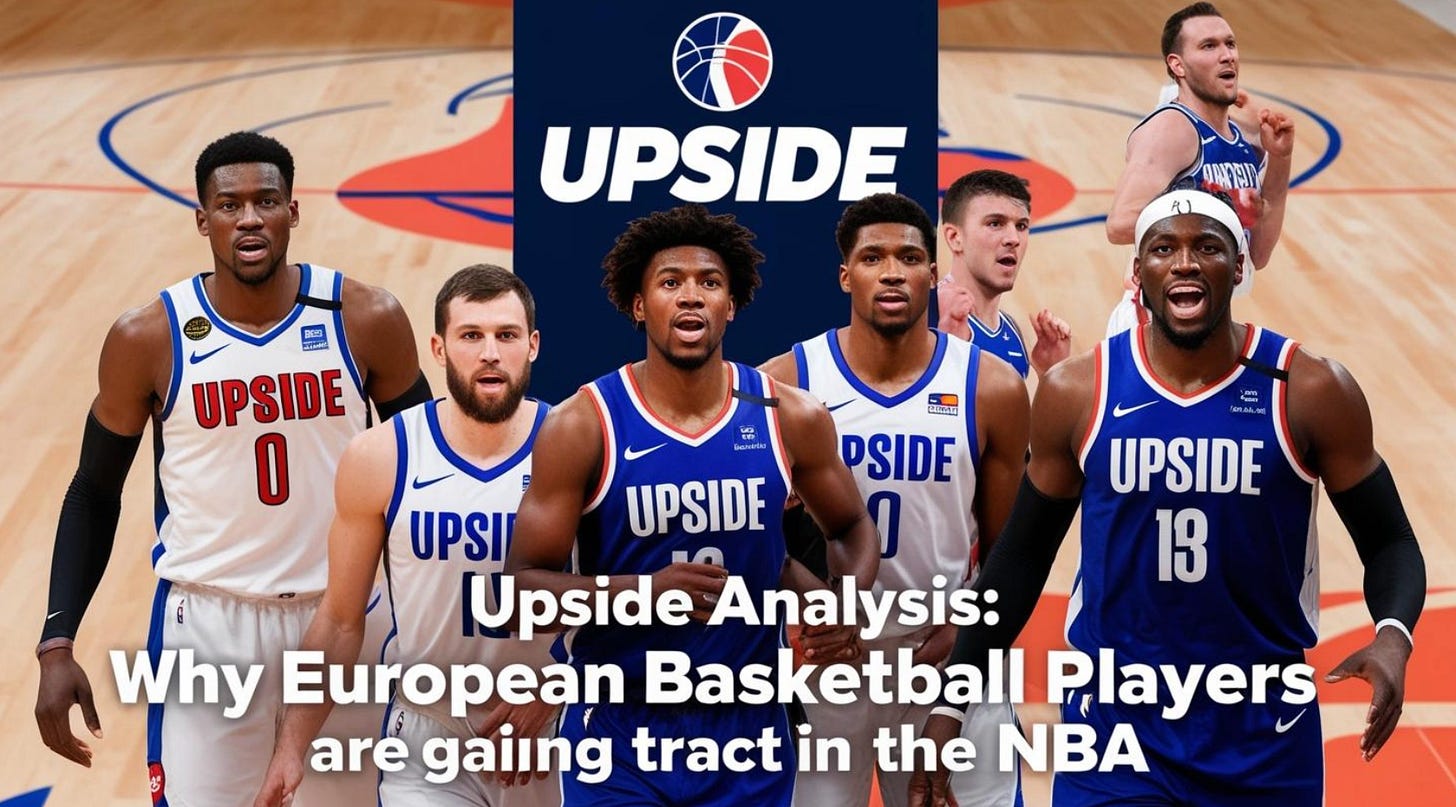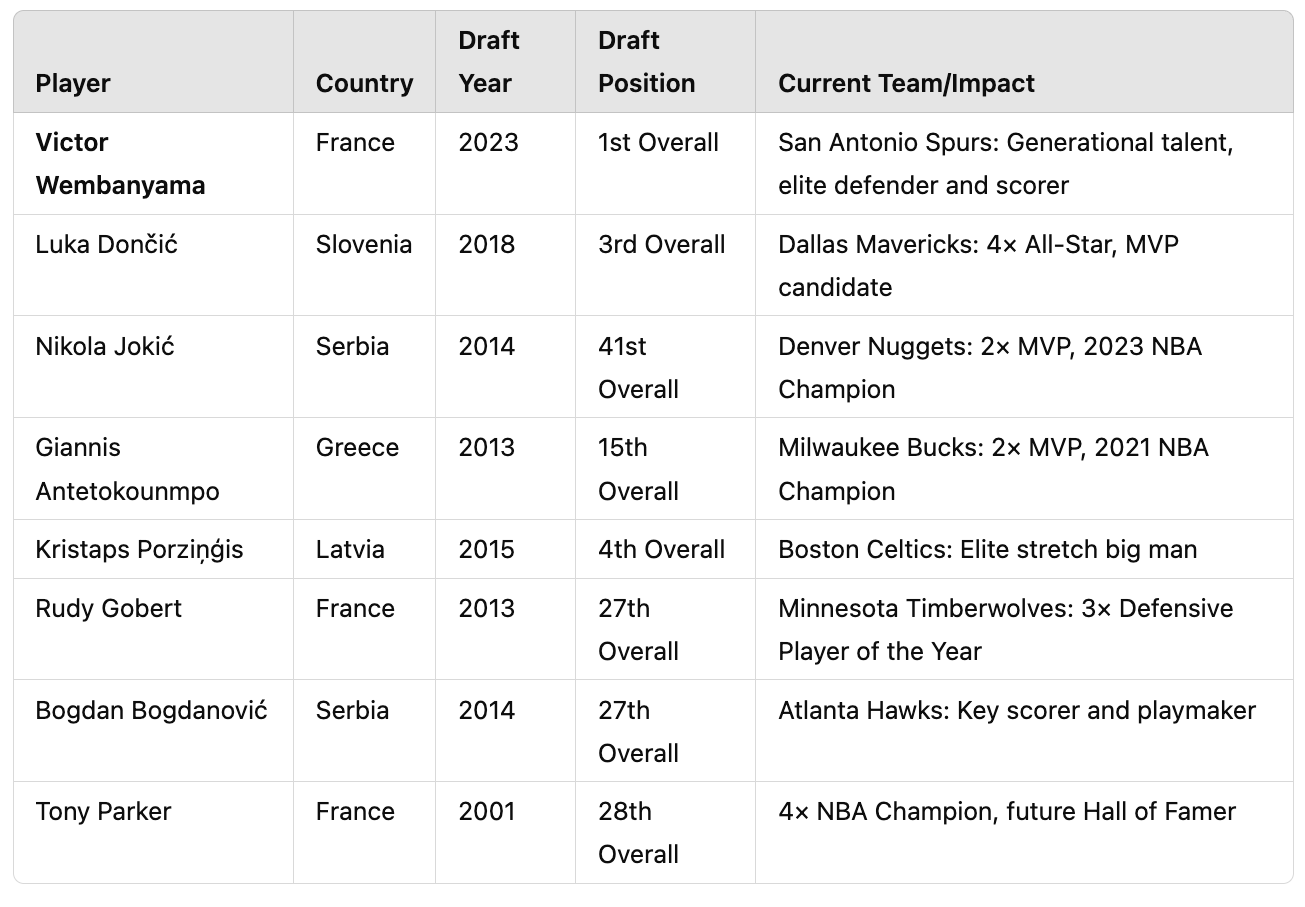🏀 Upside Analysis: Why European Basketball Players Are Gaining Traction in the NBA
Why European Basketball Players Are Gaining Traction in the NBA: A Comprehensive Analysis
The NBA has long been dominated by American-born athletes, but over the past two decades, European basketball has emerged as a critical source of elite talent. Today, European players, teams, and leagues are not just producing NBA-ready athletes—they are reshaping the league's landscape. From the individual brilliance of Nikola Jokić and Luka Dončić to the systemic impact of European leagues like the EuroLeague, the influence of European basketball on the NBA is undeniable. This analysis explores the factors driving this shift, examines key stats, and highlights how European basketball is creating a global basketball culture.
Factors Driving the Rise of European Basketball in the NBA
1. Exceptional Player Development Systems
European basketball has an edge when it comes to player development. Unlike the American AAU (Amateur Athletic Union) system, which emphasizes athleticism and high-scoring games, European leagues focus on fundamentals, teamwork, and basketball IQ. Players as young as 13 or 14 often join professional club academies, where they are taught advanced skills, such as:
Precision shooting,
Ball movement,
Defensive positioning,
Decision-making under pressure.
Notable academies like Real Madrid, FC Barcelona, and Crvena Zvezda have produced some of the biggest names in the NBA. Luka Dončić, for example, was playing professional basketball in Spain’s top league by the age of 16, an environment that prepared him for the NBA’s intense competition.
Factors Driving the Rise of European Basketball in the NBA
The core reasons for European basketball's impact remain:
Advanced player development systems,
Globalization of the NBA,
Improved international scouting,
European play styles complementing modern NBA strategies,
The EuroLeague’s status as the second-best basketball league globally.
2. Globalization of the NBA
The NBA's deliberate efforts to globalize the game have fueled the rise of European basketball. Over the last 30 years, the NBA has increased its presence in Europe through initiatives such as:
Broadcasting NBA games in European markets,
NBA Global Games (preseason and regular-season games played in Europe),
Hosting basketball clinics and camps like Basketball Without Borders.
European players have also benefited from the visibility of international tournaments like the FIBA World Cup and Olympics, where teams like Spain, Serbia, and France have repeatedly challenged the United States. For instance:
Spain’s victory in the 2019 FIBA World Cup highlighted their world-class talent pipeline.
The 2021 Olympics saw Slovenia, led by Luka Dončić, make a surprising run to the semifinals.
These global competitions have made NBA scouts more aware of the talent in Europe and have helped European players transition to the NBA with less stigma than in previous decades.
3. Scouting and Analytics Revolution
NBA teams have embraced a more data-driven approach to scouting. Instead of relying on traditional collegiate pipelines, franchises are increasingly looking at EuroLeague, EuroCup, and domestic leagues in countries like Spain, France, and Serbia. European players are scouted based on their ability to fit into specific systems:
Big men like Nikola Jokić and Domantas Sabonis are valued for their playmaking and versatility.
Guards like Luka Dončić and Bogdan Bogdanović are prized for their court vision and ability to score from anywhere on the floor.
The success of European players has validated this approach. For example:
Nikola Jokić, a second-round pick (41st overall in 2014), became a two-time NBA MVP and led the Denver Nuggets to their first-ever championship in 2023.
Giannis Antetokounmpo, a raw 15th overall pick in 2013, developed into one of the most dominant players in the NBA and won two MVPs and an NBA championship.
These scouting successes have encouraged NBA teams to take more risks on international prospects.
4. Modern NBA Style Suits European Players
European basketball emphasizes positional flexibility, ball movement, and three-point shooting—elements that align perfectly with the NBA’s current trends. European players are often described as fundamentally sound, making them a great fit for the modern "pace-and-space" era. Examples include:
Stretch big men like Kristaps Porziņģis and Nikola Jokić, who can shoot from deep and facilitate offense.
Playmaking guards and wings like Luka Dončić and Bogdan Bogdanović, who thrive in multi-positional roles.
Defensive anchors like Rudy Gobert, who excel in rim protection.
The days when European players were stereotyped as soft or one-dimensional are long gone. Today, they are considered versatile, durable, and intelligent contributors.
5. EuroLeague as the Second-Best League in the World
The EuroLeague has gained recognition as the second-best basketball league globally, behind only the NBA. Teams like Real Madrid, Anadolu Efes, and CSKA Moscow are powerhouses that consistently develop NBA-level talent. The league's physicality and high level of competition provide a rigorous environment for players to mature before making the leap to the NBA. Luka Dončić, for instance, was the EuroLeague MVP at just 19 years old before being drafted into the NBA.
Key Stats: European Players and Their Impact
Representation in the NBA
As of the 2023–24 season, 53 European players are active in the NBA, representing 17 different countries. France leads with 12 players, followed by Serbia (8) and Spain (6).
European players make up 15% of the total NBA roster in 2023–24, the largest percentage ever recorded.
European players represent nearly 25% of all international NBA players, with France, Serbia, and Spain contributing the most.
NBA Draft Success
9 of the last 20 first overall picks in the NBA Draft (2004–2023) have been international players, and 5 were from Europe: Andrea Bargnani (2006), Yao Ming (China, 2002), Anthony Bennett (Canada, 2013), and more recently Luka Dončić and Victor Wembanyama!
Awards and Recognition
European players have dominated the MVP award recently:
Giannis Antetokounmpo: 2019, 2020.
Nikola Jokić: 2021, 2022.
Luka Dončić, although not an MVP yet, has been an MVP candidate for multiple seasons and is widely seen as the future face of the league.
Impact in the NBA Draft
Victor Wembanyama (France) was selected as the 1st overall pick in 2023, further highlighting Europe's central role in NBA talent acquisition.
Top European NBA Draft Picks: A Summary
Victor Wembanyama (France): Drafted 1st overall in 2023, Wembanyama is widely regarded as a generational talent with his unique combination of size, agility, and skill at 7'4". In his rookie season with the San Antonio Spurs, he demonstrated elite defensive instincts and scoring versatility.
Luka Dončić (Slovenia): Drafted 3rd overall in 2018, Dončić quickly established himself as one of the NBA’s brightest stars. A four-time All-Star by age 24, he is known for his incredible playmaking, scoring, and clutch performances for the LA Lakers,
Nikola Jokić (Serbia): Selected 41st overall in 2014, Jokić is one of the greatest second-round picks in NBA history. A two-time MVP and 2023 NBA champion, Jokić’s ability to dominate as a passer, scorer, and rebounder makes him a revolutionary center for the Denver Nuggets.
Giannis Antetokounmpo (Greece): Drafted 15th overall in 2013, Giannis transformed from a raw prospect into one of the NBA’s most dominant players. Known as "The Greek Freak," he is a two-time MVP, 2021 NBA champion, and a global ambassador for basketball.
Kristaps Porziņģis (Latvia): Selected 4th overall in 2015, Porziņģis is an elite stretch big man who combines three-point shooting with shot-blocking ability. Now with the Boston Celtics, he has solidified himself as a key player on championship-contending teams.
Rudy Gobert (France): Drafted 27th overall in 2013, Gobert has become one of the most impactful defensive players in NBA history. A three-time Defensive Player of the Year, he is a dominant rim protector for the Minnesota Timberwolves.
Bogdan Bogdanović (Serbia): Drafted 27th overall in 2014, Bogdanović is a highly skilled scorer and playmaker. As a key player for the Atlanta Hawks, he provides consistent offense and veteran leadership.
Tony Parker (France): Selected 28th overall in 2001, Parker became one of the most successful European players in NBA history. A four-time NBA champion and Finals MVP with the San Antonio Spurs, he is destined for the Hall of Fame.
Conclusion
European basketball’s influence on the NBA has reached unprecedented levels. From producing MVP-caliber players like Nikola Jokić and Giannis Antetokounmpo to revolutionizing the game with versatile big men and skilled playmakers, Europe has become an essential talent pool for the league. This trend is poised to continue with generational talents like Victor Wembanyama, who represent the future of basketball.
The combination of superior development systems, globalization, and alignment with modern NBA strategies ensures that Europe will remain a dominant force in the league for years to come. As the boundaries between domestic and international basketball continue to blur, the NBA truly reflects the global nature of the sport today.
You may also like:


